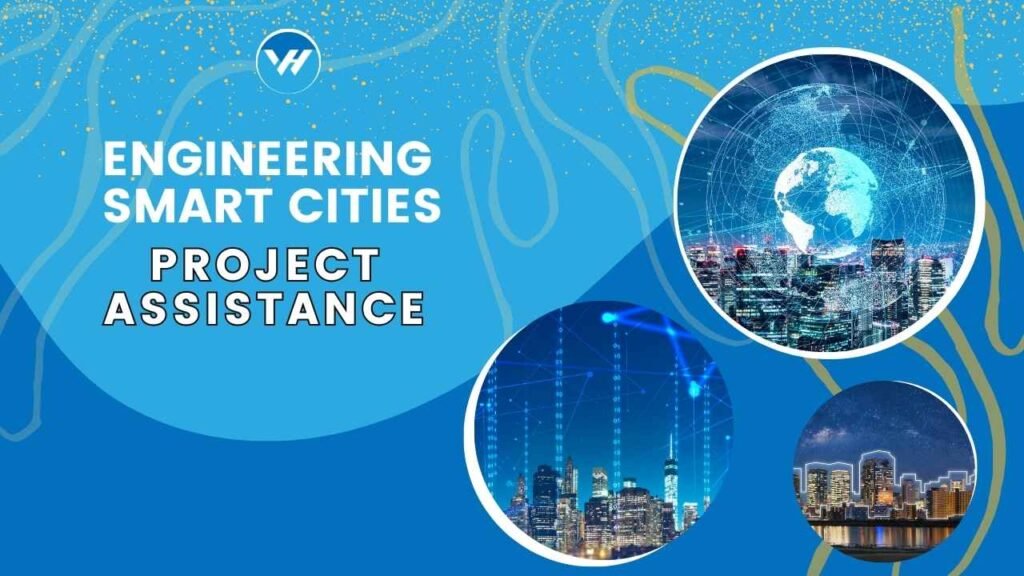Welcome to the future! Have you ever wondered what it’s like to live in a city where everything is interconnected, efficient, and sustainable? That’s what smart cities promise. These urban marvels are sprouting up worldwide, transforming how we live, work, and play. But behind every smart city is a legion of engineers making it all happen. Let’s dive into how engineers are pivotal in these projects and how you can get assistance for your smart city engineering projects.

Table of Contents
ToggleWhat are Smart Cities?
Smart cities are urban areas that leverage technology to enhance the quality of life for their residents. Think of them as the cities of tomorrow, today. Key features include interconnected systems, efficient resource management, and improved services like transportation, healthcare, and security.
Benefits of Smart Cities
Smart cities offer numerous benefits:
- Improved Quality of Life: With better services and infrastructure, residents enjoy a higher standard of living.
- Environmental Sustainability: Efficient resource use and renewable energy reduce the carbon footprint.
- Economic Growth: Enhanced connectivity and infrastructure attract businesses and foster innovation.
The Role of Engineers in Smart City Projects
Engineers are the unsung heroes behind smart cities. Their roles are multifaceted and crucial.
Urban Planning and Design
Urban planners and civil engineers collaborate to design cities that are both functional and beautiful. They ensure that all components of the city, from roads to buildings, are optimally placed and constructed.
Infrastructure Development
Infrastructure is the backbone of any smart city. Engineers develop and maintain the physical structures, including transportation systems, utilities, and public facilities.
Technology Integration
Integrating cutting-edge technology into the city’s infrastructure is essential. Engineers work on implementing IoT devices, AI systems, and other technological innovations to create a seamless and interconnected urban environment.
Challenges in Engineering Smart Cities
Despite the exciting prospects, engineering smart cities come with challenges.
Technical Challenges
Implementing advanced technologies at a city-wide scale is no small feat. Engineers must ensure these systems are reliable, secure, and scalable.
Environmental Concerns
Balancing development with environmental sustainability is crucial. Engineers must design systems that minimize ecological impact and promote green living.
Socio-Economic Issues
Smart cities must be inclusive, catering to all socio-economic groups. Engineers need to create affordable solutions that benefit everyone, not just the elite.
Smart City Technologies
Several technologies are at the heart of smart city projects.
Internet of Things (IoT)
IoT devices collect and transmit data, enabling real-time monitoring and management of city systems. From smart streetlights to intelligent waste bins, IoT enhances efficiency and responsiveness.
Artificial Intelligence (AI)
AI processes vast amounts of data to optimize city operations. It can predict traffic patterns, manage energy use, and even monitor air quality.
Big Data and Analytics
Big data analytics helps in decision-making by providing insights into various city functions. It can identify trends, forecast demands, and improve services.
Sustainable Practices in Smart City Projects
Sustainability is a core principle of smart cities.
Renewable Energy Sources
Smart cities harness renewable energy sources like solar, wind, and hydroelectric power. Engineers design systems that integrate these sources into the city’s power grid.
Efficient Waste Management
Engineers develop smart waste management systems that reduce waste and promote recycling. IoT-enabled bins, for instance, can signal when they need to be emptied, optimizing collection routes.
Water Conservation Techniques
Smart cities employ technologies to monitor and manage water use, reducing waste and ensuring a sustainable supply. Engineers design systems for rainwater harvesting, greywater recycling, and leak detection.
Engineering Project Management for Smart Cities
Effective project management is crucial for smart city projects.
Planning and Scheduling
Engineers meticulously plan and schedule each phase of the project, ensuring timely completion and efficient resource use.
Resource Allocation
Optimal allocation of resources, including materials, labor, and technology, is essential. Engineers balance cost and efficiency to achieve the best outcomes.
Risk Management
Identifying and mitigating risks is a key aspect of project management. Engineers anticipate potential issues and develop strategies to address them.
The Importance of Interdisciplinary Collaboration
Building a smart city requires collaboration across various disciplines.
Collaboration Between Engineers and Urban Planners
Urban planners and engineers must work together to design and implement cohesive solutions that meet the city’s needs.
Role of Government and Private Sector
Public-private partnerships are often necessary for funding and implementing smart city projects. Collaboration between government bodies and private companies ensures resources and expertise are available.
Community Involvement
Engaging the community is crucial. Residents’ input helps shape projects that meet their needs and gain public support.
Tools and Software for Smart City Engineering
Several tools and software aid in smart city engineering.
GIS (Geographic Information System)
GIS technology helps in mapping and analyzing spatial data, essential for urban planning and infrastructure development.
BIM (Building Information Modeling)
BIM software facilitates the design and management of buildings and infrastructure projects, ensuring efficiency and accuracy.
Smart Grid Technologies
Smart grids enhance the efficiency and reliability of the city’s power supply, integrating renewable energy sources and improving demand management.
Future Trends in Smart City Engineering
The future holds exciting possibilities for smart cities.
Autonomous Vehicles
Self-driving cars and public transport systems can revolutionize urban mobility, reducing traffic congestion and emissions.
Smart Healthcare Systems
Technology can enhance healthcare delivery, with remote monitoring, telemedicine, and AI-driven diagnostics.
Enhanced Connectivity (5G and Beyond)
Advanced connectivity technologies will enable faster, more reliable communication, supporting various smart city applications.
How Virtual Help Assists in Engineering Smart Cities Projects
Virtual Help is your go-to resource for engineering smart cities projects. Whether you’re a student or a professional, Virtual Help offers expert assistance and resources.
Finding Expert Tutors
With Virtual Help, you can connect with expert tutors who specialize in smart city engineering. They provide personalized guidance and support.
Getting Assignment Help
Stuck on a project or assignment? Virtual Help offers tailored assistance to help you overcome challenges and succeed.
Accessing Resources and Tools
Virtual Help provides access to a wealth of resources and tools, including study materials, software, and tutorials.
Steps to Get Assistance from Virtual Help
Ready to get started with Virtual Help? Here are the steps:
Downloading the App
Download the Virtual Help app from the iOS or Android store. It’s your gateway to expert assistance.
Creating an Account
Sign up and create your account. It’s quick and easy, and you’ll be ready to access all the features.
Finding Tutors and Resources
Browse through the available tutors and resources. Select the ones that match your needs and start getting the help you need.
Conclusion
Engineering smart cities is a complex but rewarding endeavor. With the right knowledge, tools, and assistance, you can contribute to creating the cities of tomorrow. Virtual Help is here to support you every step of the way, providing expert guidance and resources. Embrace the future of urban living and make a difference in the world.
FAQs
- What is a smart city?
- A smart city uses technology to enhance the quality of life for its residents through interconnected systems and efficient resource management.
- How do engineers contribute to smart cities?
- Engineers play a crucial role in designing, developing, and integrating the infrastructure and technology that make smart cities possible.
- What technologies are used in smart city projects?
- Key technologies include IoT, AI, big data analytics, renewable energy systems, and smart grids.
- How can students get help with smart city projects?
- Students can get help through platforms like Virtual Help, which offer expert tutoring and resources for smart city engineering projects.
- What is Virtual Help and how does it work?
- Virtual Help is an app-based service that connects students with expert tutors and provides assignment help. Users can download the app, create an account, and access various resources and support.





